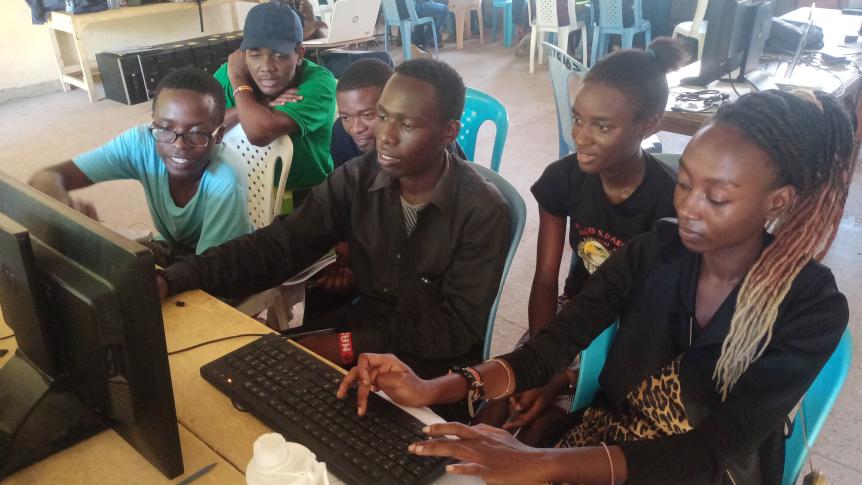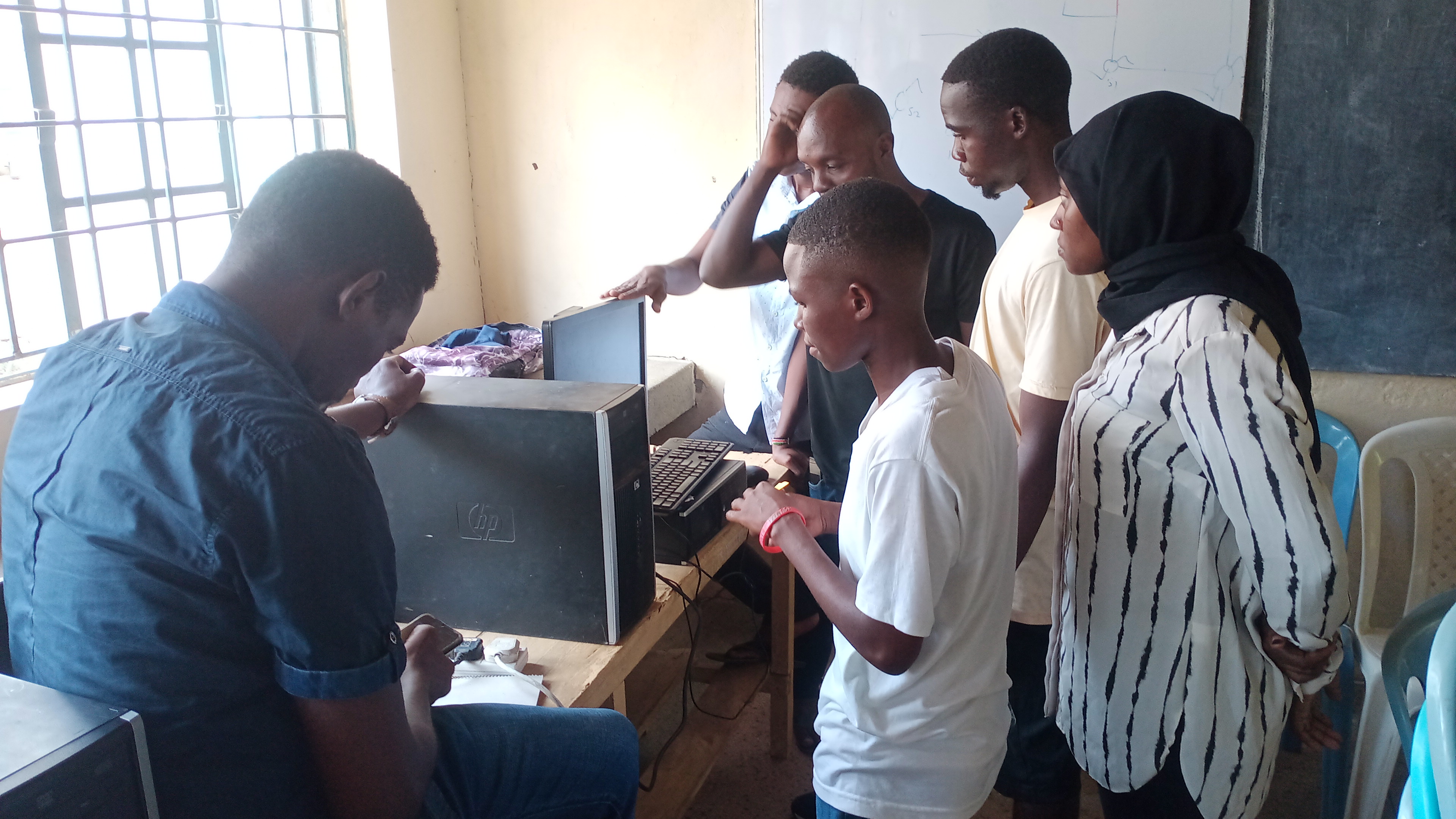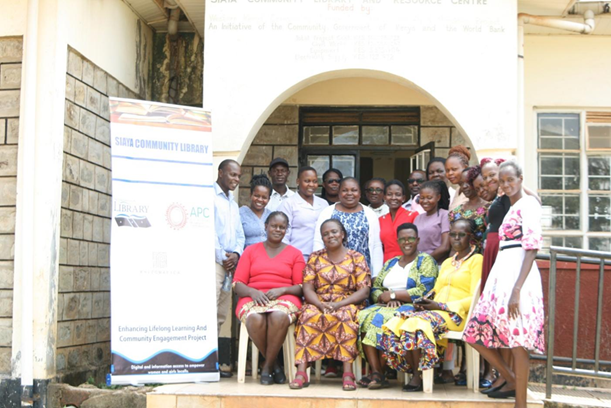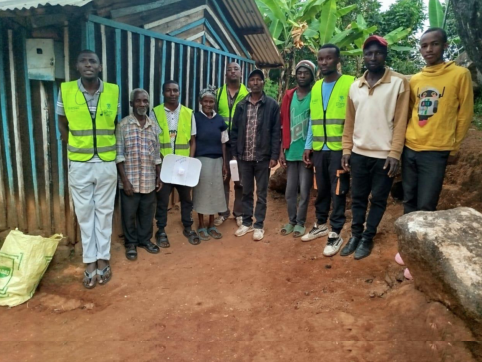
Across Kenya and South Africa, communities once considered unconnectable are now proving to be pioneers. The partners from the Local Networks (LocNet) initiative, led by APC and Rhizomatica, on the ground – including women, youth and grassroots technologists – are not just wiring villages and settlements, they’re rewriting what inclusion, innovation and empowerment look like in the digital age. Behind every access point and router is a story. And these stories, from Nairobi’s Mathare Valley to the hills of Mankosi, are reminders that real infrastructure is built with people.
Here we share a bit more about 13 inspiring initiatives in Kenya and South Africa. As we look ahead, these stories remind us that connectivity is not just technical, it's deeply human. And when the infrastructure of care, trust and peer support is built alongside the technical, true transformation follows.
Amadiba Community Network: From learners to leaders in South Africa
In 2021, three fresh graduates from the School of Community Networks were handed basic equipment and challenged to build their first hotspot with no technician in sight.
“We were just three naïve students… and we made it work.”
By 2025, that seed grew into something transformative. Through a visit from Zenzeleni’s technical team supported by LocNet, the Amadiba Community Network installed a new hotspot and led a vibrant discussion with local women and youth about telecoms, gender and the future of tech. That dialogue sparked something bigger: the formation of a monthly peer-learning hub across multiple solar-powered labs, including two other community networks in South Africa, Mamaila and Zenzeleni.
Tanda: Reimagining local content in Kenya
While many community networks focus on towers and bandwidth, Tanda Community Network in Kenya has been quietly transforming something just as powerful: the stories, content and cultural knowledge that communities generate but that are often not acknowledged as belonging to them. Their work has become a bridge between connectivity infrastructure and the invisible cultural infrastructure that sustains communities: language, narrative and representation.
In collaboration with other community networks in the country – Kijiji Yeetu, Oasis Mathare and Dunia Moja – Tanda embarked on a thematic research journey to understand what local content means to different communities and what barriers exist to its production, ownership and visibility. This sparked enriching discussions that encompassed the specific principles and values of communities related to local content, tools and technologies as enablers of local content production, and regulatory frameworks that support or hinder the development of the local content ecosystem within the community networks movement in the country, which resulted in an in-depth research report that documents with clarity the challenges, opportunities and recommendations.
V-NET: Upskilling women, powering households in South Africa
In Cape Town’s Khayelitsha neighbourhood, V-NET made a deliberate move to bring more young women into high-skill technical roles in their community-centred connectivity initiative. Before receiving a subgrant from LocNet, only two people handled router configuration. Now, six people including two young women can handle complex setups. Four of their team members enrolled for ICDL computer literacy certification, and another, fresh out of school, joined the team to build awareness around alternative education pathways in tech.
What is the network’s impact? Parents are subscribing to V-NET to relieve mobile data burdens and support schoolwork. One student who relied on V-NET Wi-Fi since grade 11 in school earned five distinctions and is now studying for a Bachelor of Science degree in Audiology. Community-centred connectivity is an enabler of the right to education.
Dunia Moja: Bridging digital and cultural gaps in Kenya
What started as a modest skills-building workshop at Mkwajuni Vocational Training Centre has now sparked a full-fledged digital movement across Kilifi County in Kenya. At the heart of this transformation is the Dunia Moja Community Network, whose Netwardens programme is redefining what’s possible when rural youth are trusted to build, manage and innovate digital infrastructure from the ground up. Young people gained confidence and competence; they began envisioning new ways to connect their own communities and then building them.

Young people began envisioning new ways to connect their own communities. Photo by Dunia Moja.
After witnessing the tangible success of the Netwardens initiative, the County Government of Kilifi made a bold move: it will now partner with Dunia Moja to connect all county vocational training centres – and by extension, the surrounding communities – to the internet. Perhaps the most charming and impactful innovation to come from Dunia Moja’s youth is the Boda-Fy, a repurposed motorcycle converted into a moving mobile hotspot. Designed by students who once knew nothing about connectivity, Boda-Fy now brings Wi-Fi access to rotational markets across Kilifi, reaching vendors, youth and farmers who have never had stable internet access.
Kijiji Yetu: Code, create, connect in Kenya
Between November and December 2024, Kijiji Yeetu rolled out Dala Scratch 3.0, an educational initiative designed to introduce children and youth to programming through Scratch, a visual coding platform developed by the Media Lab of the Massachusetts Institute of Technology (MIT) in the US. What started as a pilot quickly grew into a transformative experience for over 120 participants, including pupils, teachers and young girls, many of whom were encountering coding for the first time.
Beyond the bootcamp, the initiative helped establish information and communications technology (ICT) clubs in participating schools, creating a platform for sustained engagement and peer learning. These clubs are now serving as digital sandboxes, spaces where students continue exploring, learning and sharing their tech interests with others. Another key concern of the initiative was to promote gender equity in initiatives for local access. One of the projects of this educational programme, ICT 4 Girls/Young Mothers Gender Bootcamp, saw participation from 132 girls and 15 organisations across five counties: Siaya, Bungoma, Busia, Kisumu and Migori. The bootcamp aimed to enhance digital literacy among students and parents, enabling them to use the internet and digital tools safely and effectively.
Global Innovation Valley: From refugee volunteer to finance lead in Kenya
In Kakuma, Buom, a refugee youth, began as a volunteer with Global Innovation Valley (GIV). During the training, Buom was introduced to QuickBooks, a tool he had never used before. He was amazed by how efficiently it could generate financial reports that once took him an entire month to prepare; a profit and loss statement could now be done with just a few clicks. This experience not only boosted his confidence, but also transformed the way he understood financial management.
Through hands-on training in QuickBooks and digital entrepreneurship, he rose to become accounts lead, managing financial systems with confidence.
“The training gave me the tools, but it was the belief in me that changed everything.”
SOWUG: Licensing in South Africa
With LocNet support, SOWUG secured a licence from the Independent Communications Authority of South Africa (ICASA), the official regulator in the country, which is a rare feat for a grassroots network. That allowed them to provide backhaul for several Eastern Cape and Mpumalanga community networks via the Openserve Fibre Network. SOWUG has onboarded an additional woman for administrative and client support who has been trained on fibre support. They are migrating wireless clients to fibre and deploying wireless radios to informal settlements, removing installation costs.
Black Equations: Certification meets confidence in South Africa
Black Equations is a community network based in Ocean View, Western Cape in South Africa. Two of its technicians, Ganief Manuel and Ralph Higgins, completed their Certified Fibre Optic Technician (CFOT®) training in Johannesburg in January of this year. It wasn’t easy, especially for Ralph, who struggled with test anxiety.
“When Ralph passed, something shifted. It wasn’t just about fibre, it was about belief.”
Ganief also completed facilitator and assessor training, formalising years of informal mentoring. Now their team teaches others, with the legitimacy and structure they lacked before.
Siaya community library: Literacy, self-esteem and the joy of access in Kenya
In western Kenya, Siaya’s community library trained 5,800 students in digital literacy, online safety and confidence building.
“We didn’t just teach ICT, we raised self-esteem.”
Teachers and community mentors were trained using gender-responsive materials, creating welcoming spaces for girls and first-time tech users. Plans are underway to expand via a mobile digital library.

Teachers and community mentors created welcoming spaces for girls and first-time tech users. Photo by Siaya’s community.
Zenzeleni and Mamaila: Leadership and lab-to-lab learning in South Africa
Zenzeleni and Mamaila Community Networks developed a Solar Learning Lab partnership funded by Computer Aid International. A Solar Learning Lab is a solar-powered computer space, housed in a converted shipping container. This collaboration has created a rich learning environment where operational challenges, innovations and educational approaches are shared freely, inspiring plans for future face-to-face peer exchanges involving technical staff, lab facilitators and community representatives from both locations.
This lab-to-lab experience is now a model for Computer Aid International’s other sponsored hubs across Africa, potentially creating a network of learning centres that share best practices, solve technical challenges collectively, and develop locally adaptable training methodologies.
AHERI: Spearheading two groundbreaking community networks in Kenya
The Africa Higher Education Research Institute (AHERI) is an organisation spearheading two groundbreaking community networks: the Mutua and Sipili Community Networks. Launched in 2025, the Mutua Community Network quickly became a lifeline for education and communication in a region where internet access was almost non-existent. Over 1,000 daily users now rely on the network, including students, teachers and local businesses.
Beyond usage statistics, the real success lies in how the network ignited local demand for digital education, creating a ripple effect across the region. Following the launch, Mutua Secondary and Primary Schools hired ICT teachers, responding to the increased demand for computer literacy sparked by the new connectivity initiative. Supported by LocNet’s micro-grant programme, AHERI isn’t just laying down cables, it’s laying the foundations for inclusive, sustainable digital ecosystems.
Sipili Community Network: Upgraded infrastructure, expanded reach
Located in a more semi-urban setting, the Sipili Community Network transitioned from a wireless-only network to a hybrid model, combining Wi-Fi, fixed access and public hotspots. Fixed users jumped from 15 to 65, including government offices, schools and businesses. Two new hotspots at Sipili Market now serve over 100 people daily, including traders, matatu drivers and street vendors.
Athi: From struggle to signal in Kenya
In the hilly terrains of Igembe South, Meru County, where rugged topography and limited infrastructure often isolate communities from digital life, a bold experiment in grassroots technology is rewriting the future. When the Athi Community Network first set out to deploy a community-led wireless internet service, the team was full of passion but low on technical experience. The plan was ambitious: connect six remote locations, including schools, health centres and markets, using a distributed wireless network. The arrival of Mr. Oscar Wanjala, a network engineer contracted through LocNet support, was a turning point.

Installing a network relay from a community member’s home to connect to mutiokiama health centre. Photo by Athi.
Athi needed a creative solution to reach both the health centre and Kiiji Market in this region. The answer? Pull a fibre optic cable from the neighbouring school. Community members donated poles, mounted the cable across forested areas, and spliced and fused fibre using their own hands and newly acquired skills.
In just a few months, a group of digital novices in Meru transformed into confident technicians connecting not just devices, but futures. They’ve proven that given trust, time and training, rural communities can build and sustain their own internet infrastructure, even in the most challenging terrain.
“We were splicing fibre and running lines parallel to electricity cables through banana and miraa farms. That’s when we realised, we’ve got this.”
Lessons across borders
Peer learning builds confidence when communities share knowledge. True inclusion means designing gender equity into programmes from the start, not treating it as an afterthought. Certification combined with practical training opens doors to jobs and recognition. The impact goes far beyond access: it shapes futures in education, employment and more. Lessons like these can inspire other initiatives around the world.
Despite different landscapes, the stories from Kenya and South Africa echo each other, as defined by one community network leader:
“We started with cables. Now we’re building confidence, careers and communities.”
Find out more about lessons learned in Africa here.
Rebecca Ryakitimbo is a feminist technologist and researcher working at the intersection of AI, gender justice and digital equity. She supports feminist tech spaces such as the African Women School of AI and curates the Gendering AI conference. As part of LocNet, she supports community-centred connectivity initiatives by facilitating communities of practice and researching community-centred connectivity and local services for equitable, locally led digital ecosystems.
The experience shared in this blog was supported by the Local Networks (LocNet) initiative through a cycle of microgrants made available via a closed call to the initiative's partners and community networks in Brazil, Indonesia, Kenya and South Africa. Learn more about the call here.